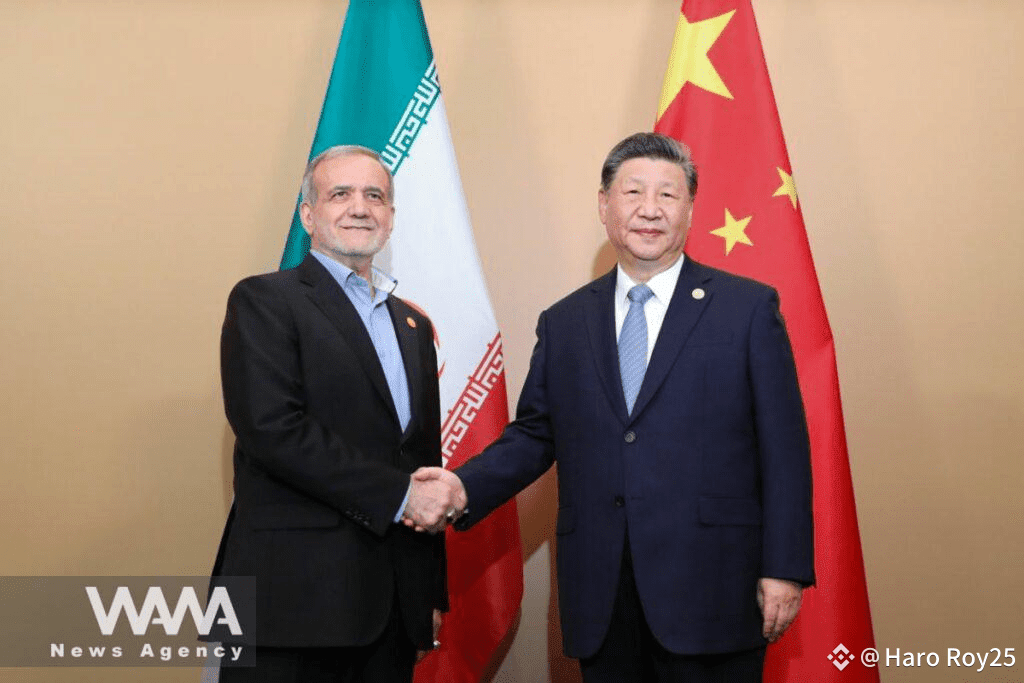Beijing's Grand Ambitions Tested as Middle East Flames Blaze! 🔥
The recent fiery exchanges between Israel and Iran, with missiles flying and tensions soaring, have thrown a stark spotlight on China's much-touted diplomatic muscle in the Middle East. Despite Beijing's earnest efforts to appear as a neutral, all-powerful peacemaker, analysts are now whispering that the conflict has revealed the surprisingly limited reach of its influence, especially when its key partners are at each other's throats. 😬
While China was quick to issue calls for de-escalation and a ceasefire 🗣️🕊️, its role remained largely confined to polite pronouncements. This is a far cry from its heavily publicized triumph in brokering the Iran-Saudi Arabia détente in 2023. Experts suggest this latest showdown has highlighted a tough truth for Beijing: its global leadership aspirations are clashing with its cozy relationship with Iran, and its noticeable lack of deep political or military sway with Israel. 🤷♀️

💰⛽ Economic Interests & Energy Security: China's Top Worries! 🚨
For China, the Israel-Iran spat hits hardest in its wallet. A prolonged conflict or, even worse, an Iranian blockade of the vital Strait of Hormuz 🚢 could send global oil prices skyrocketing, threatening China's energy security and its entire economic stability. As a massive importer of Iranian oil, China has a huge stake in keeping the region calm. But this very reliance also puts a leash on its ability to truly pressure Tehran without shooting itself in the foot. 📉
Analysts like Professor John Gong from the University of International Business and Economics in Beijing emphasize that China's number one goal during the conflict was to dodge an energy crisis. This economic imperative often dictates a super cautious diplomatic dance, focusing on cooling things down rather than picking sides that could jeopardize its precious trade and investments. 🤝
🤝🇮🇷 The Tightrope Walk: Iran as a Partner, But No Military Muscle? 🤸♂️
China sees Iran as a strategic buddy, especially for its ambitious Belt and Road Initiative and as a counterweight to perceived Western influence. This partnership is cemented by their "comprehensive strategic partnership" and chunky Chinese investments in Iran's infrastructure and energy. Beijing has consistently slammed what it calls violations of Iran's sovereignty and loudly championed Tehran's right to defend itself. 💪
Yet, despite all the verbal support, China notably kept its hands in its pockets when it came to offering any real aid, especially military hardware, to Iran during the recent flare-up. This reveals a critical weakness: China just doesn't have the military reach or the appetite to get dragged directly into Middle Eastern wars. Its influence remains mostly financial, and its diplomatic toolkit is largely limited to calling for talks and issuing UN statements. As some observers wryly note, when the bullets are flying, Iran needs more than just nice words. 🤐
🤔❓ Mutual Doubts & Trust Issues? 💔
The China-Iran relationship, while strategically important, is often described as "transactional and a bit shallow." There's a hint of mutual suspicion, with past instances of Iran grumbling about its long-term cooperation deal with China. Plus, China's good relations with Iran's regional rivals, like the UAE and Saudi Arabia, add another layer of complexity and can definitely rub Tehran the wrong way. 😠
Conversely, Israel remains wary of Beijing's ties with Iran, which further shackles China's ability to be a truly neutral and effective mediator. Without deeper political pull and military heft, China's offers to mediate, while showing its desire for a responsible global role, ultimately appear to lack genuine power. 😟
🔮 What's Next? A Shift in Perception? 🧭
The Israel-Iran conflict has undoubtedly given China's Middle East strategy a rigorous stress test. While Beijing has tried to position itself as the champion of the "Global South" and a more impartial player than the U.S., its subdued response has laid bare the inherent limits of its "security by subtraction" approach – one that relies on economic deals and diplomatic balancing rather than sheer force. 😬
Looking ahead, this conflict might just be the catalyst for China to fine-tune its Middle East game plan. While it will absolutely keep its eyes on energy security and economic gains, the stark realization of its "limited leverage" during real crises might lead to a more nuanced foreign policy. It's about balancing its ambitions for global leadership with the harsh realities of its regional influence. The prevailing sentiment in the Middle East, according to some experts, is now that China has little, if any, real power to decisively de-escalate such raging
conflicts. 📉😔